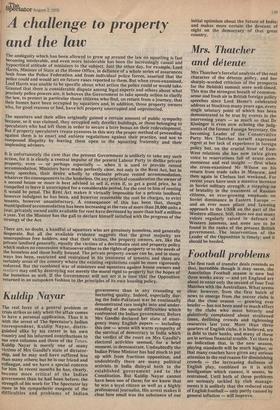A challenge to property and the law
The ambiguity which, has been allowed to grow up around the law on squatting is fast becoming intolerable, and even more intolerable has been the increasingly casual and hypocritical attitude of ministers to the subject Just the other day, for example, Lord Harris, Minister of State at the Home Office, in defiance of a whole series of assurances both from the Police Federation and from individual police forces, asserted that the police could and would act on future cases reported to them. But when cross-examined, Lord Harris was unable to be specific about what action the police could or would take. Granted that there is considerable dispute among legal experts and others about what precisely police powers are, it behoves the Government to take speedy action to clarify the law, to protect in particular those citizens who find, on return from a journey, that their homes have been occupied by squatters and, in addition, those property owners Who, for good reasons or bad, have' left property unoccupied and unprotected.
The squatters and their allies originally gained a certain amount of public sympathy because, so it was claimed, they occupied only derelict buildings, or those belonging to Speculators who had left them in order to secure a later bonus on their redevelopment. But if property speculators create eyesores in this way the proper method of proceeding against them is to enact and enforce regulations against their practice, and not to compound illegality by leaving them open to the squatting fraternity and their tmpleasing advisers.
It is unfortunately the case that the present Government is unlikely to take any such action, for it is clearly a central impulse of the present Labour Party to dislike private property, even — or perhaps especially — when it is used to provide rented accommodation. Ministers have made perfectly clear, not only in the Rent Act, but in many speeches, their desire wholly to eliminate private rented accommodation, Whatever the consequences to the homeless. On any practical consideration the owner of a second house or more is best advised to sell it, even if, to get a good price, he is compelled to leave it unoccupied for a considerable period, for the cost to him of renting it would be penal. The Rent Act makes it virtually impossible for a private landlord, however indulgent he has been, and however reasonable the rent he charges, to evict tenants, however unsatisfactory. A consequence of this has been that, though municipalised accommodation has been increasing at the rate of more than 20,000 units a year, privately owned units available for rent have decreased by more than half a million a year. Yet the Minister has the gall to declare himself satisfied with the progress of the strategy of the Act.
There are, no doubt, a handful of squatters who are genuinely homeless, and generally desperate. But all the available evidence suggests that the great majority are unscrupulous free holders, and that their victims, the property owners, are, like the private landlord generally, equally the victims of a doctrinaire rent and property policy which makes no concession whatsoever either to the rights of property or to the needs of the homeless and those badly housed. The private property owner can be, and in many Ways has been, restricted and restrained in his treatment of tenants; and there are certainly areas of the country where the existing regulations could be more vigorously enforced. But the combined war of ministers and squatters against house owners and rent iers may end by destroying not merely the moral right to property but the hopes of the homeless as well. If the Government will not act it is time that the Opposition returned in an outspoken fashion to the principles of its own housing policy.













 Previous page
Previous page